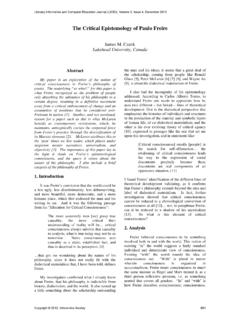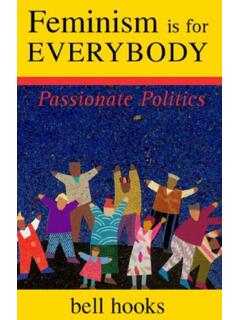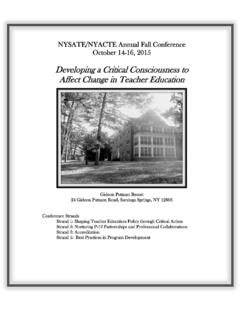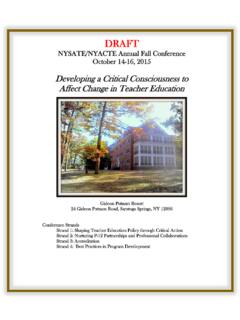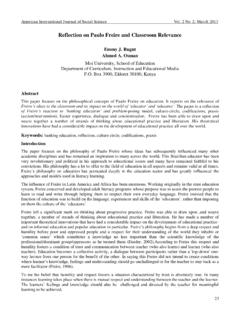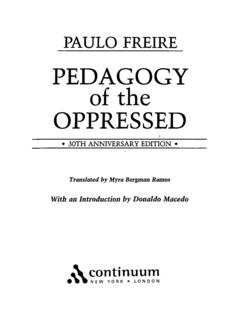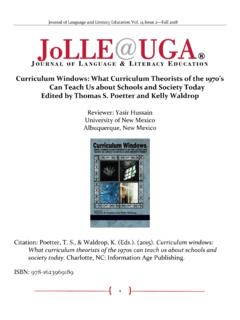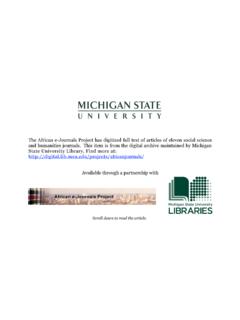Transcription of Applying Critical Consciousness: Culturally Competent ...
1 Applying Critical consciousness : Culturally Competent disaster Response Outconnes Rachael D. Goodman and Cirecie A. West-Olatunji H i h e authors explored the use of Critical consciousness as a training tool to provide effective, Culturally Competent di- saster response counseling services to disaster -affected communities. The results are presented of a qualitative study evaluating the outcomes for participants in a disaster response outreach project serving residents of post-Katrina New Orleans. Participants demonstrated increased personal and cultural awareness and also constructed new knowledge related to counseling outreach competencies. Because of the devastating effects of natural and human-made were adequately trained. Some of those deployed lacked skills disasters, there is an increasing global need for mental health in trauma and crisis counseling and an awareness of the role professionals to provide disaster relief outreach services of a postdisaster mental health worker.
2 (Guha-Sapir, Hargitt, & Hoyois, 2004; Herman, 1997; Mental health and disaster response professionals agree Committee for Refugees and Immigrants, 2006; Walter, that both preparation and cultural competence are neces- 2005). Mental health professionals are responding to disasters, sary in effective disaster responses (Halpem & Tramontin, including hurricanes in the United States and earthquakes in 2007). Findings of the Institute of Medicine's Committee on Armenia (Kalayjian, 1995). The counseling profession has Responding to the Psychological Consequences of Terror- begun to foster a global counselor identity through endeav- ism indicated that mental health professionals often do not ors such as the global mental health facilitator designation have disaster response experience or training (cf. Reid et al., established by the National Board for Certified Counselors 2005). Furthermore, there is a notable absence of literature International (2007).
3 However, the counseling profession establishing the practice of and training for cultural competen- has not developed an initiative that places counselors at the cies in disaster relief (Mollica et al., 2004). This suggests that forefront of providing disaster response services on a global current disaster preparation may be insufficient. Moreover, it level. Cultural competence involves three primary attributes: is crucial that counselors become more Culturally Competent (a) the therapist's awareness of her or his own worldview, (b) so that they can better meet the increasing need for disaster the therapist's development of an understanding of the client's response within global and multicultural contexts. worldview, and (c) the therapist's development of Culturally appropriate clinical interventions (Sue & Sue, 2003). By The Need for Culture-Centered disaster Response creating Culturally Competent disaster outreach experiences, counselors can provide disaster mental health services to com- Critical in the successful assessment, conceptualization, and munities in need.
4 In this way, the counseling profession can treatment necessary for a client's progress is an understanding carry out its expressed commitment to social justice (Kiselica of the cultural, social, and historical context of the present- & Robinson, 2001) and cultural competence (Arredondo et al., ing problems (Goodman & West-Olatunji, 2008). Issues of 1996). The purpose of this study was to expand counselors' macrosystemic oppression and historical trauma contextualize knowledge of cultural competence, using Critical conscious- individuals' predilections toward not only the counseling ex- ness (Freir , 2000) as a framework, when engaged in disaster perience, but also the counselor (Cross, 1998; Harrell, 2000). relief counseling services. Understanding sociocultural conditions facilitates the concep- tualization of the needs of individuals in ethnically diverse and low-income communities (West-Olatunji, 2008).
5 Multicultural Review of the Literature counseling research suggests that there are differences in the In the response to the aftermath of Hurricane Katrina in the cultural orientations between dominant and nondominant indi- Gulf Coast region of the United States, the American Coun- viduals (Atkinson, 2004; Holdstock, 2000; Ibrahim, Roysircar- seling Association (ACA) referred approximately 20% of the Sodowsky, & Ohimshi, 2001; Roysircar, Arredondo, Fuertes, mental health counselors who were deployed by the Substance Ponterotto, & Toporek, 2003; Sue & Sue, 2003). Clients' ad- Abuse and Mental Health Services Administration ( Kennedy, herence to their own cultural orientations influences the types 2006). ACA's executive director, Richard Yep, recognized that of coping strategies they use. Thus, counseling interventions not all mental health professionals deployed to the Gulf Coast that are informed by cultural values can increase efficacy by Rachael D.
6 Goodman and Cirecie A. West-Olatunji, Department of Counselor Education, University of Florida. Correspondence concerning this article should be addressed to Rachael D. Goodman, Department of Counselor Education, University of Florida, 1215. Norman Hall, PO Box 117046, Gainesville, FL 32611-7046 (e-mail: 2009 by the American Counseling Association. All rights reserved. 458 Journal of Counseling & Development Fall 2009 Volume 87. Culturally Competent disaster Response intentionally incorporating these strategies (Pedersen & Ivey, (McKnight, 2004; Sakamoto & Pitner, 2005). The develop- 1993). Furthermore, counselors' personal biases can limit their ment of Critical consciousness may also allow counselors cultural competence and reduce their efficacy with Culturally to work collectively with colleagues, thereby transforming diverse clients (Constantine, 2002). the experience of working in a group into one of reciprocity, engagement, and growth (Campbell & MacPhail, 2002; Gay Training for Critical consciousness & Kirkland, 2003).)
7 Critical consciousness involves the ability to reflect on one's The theory of Critical consciousness has been used in the personal biases in working collaboratively with individuals counseling profession and in other professions as a tool for and community stakeholders to take action and transform ex- the development of cultural competence and social justice isting obstacles to a satisfactory quality of life (Freir , 2000). ideals (Alschuler, 1986; Hanna, Talley, & Guindon, 2000). Critical consciousness has been used in educational training The process of increasing awareness through reflection is programs and community development initiatives to foster Critical in the development of cultural competence because awareness, empowerment, and social justice ideals (Harden, it can liberate individuals from socially embedded and often 1996; Watts, Williams, & J gers, 2003). This praxis-oriented unconscious hegemonic views (D'Andrea, 2005; Ivey & Col- perspective establishes counselors as Critical coinvestigators lins, 2003).
8 Freire's (2000) theory has been used to facilitate with the community they are serving (Nelson & Neufeldt, Critical thinking and to engender a greater understanding 1998). Thus, Critical consciousness can serve as a vehicle for of oppression, leading to action orientated to social justice the development of empowerment and cultural competence. (Watts, Griffith, & Abdul-Adil, 1999). Before the study, we Infusing the principles of Critical consciousness into counselor used established models of Critical consciousness to identify training for disaster response prepares clinicians for current seven steps and corresponding outreach protocols that would and future disasters service. help disaster response participants move toward Critical con- The process of becoming critically conscious begins sciousness (see Table 1). with reflection and the development of awareness (Harden, Critical consciousness ofl rs a model that can improve coun- 1996).
9 During this process, awareness of personal biases and selor training and increase cultural competence. The purpose of a deeper understanding of complex social issues develop this study was to determine whether incorporating Critical con- (Ginwright & Cammarota, 2002; Hernandez, Almeida, & sciousness in a training experience in disaster mental health would Dolan-del Vecchio, 2005; McKnight, 2004; Sakamoto & increase counselors' cultural competence. We hypothesized that Pitner, 2005). This awareness engenders transformation in as a result of involvement in an outreach experience, participants interpersonal relationships whereby counselors seek more would demonstrate Critical consciousness that would inform collaborative and empowering relationships with their clients their disaster response and cultural competencies. We asked TABLE 1. Assessing and Developing Critical consciousness in disaster Response Steps Description Outreach Protocol Participant Quotes 1.
10 Awareness Participants recognize that they The appiication process inciuded (a) "I am embarrassed to admit that I did (Sakamoto & bring their own biases into the short-answer items, (b) essay, (c) not expect New Orleans to be so rich Pitner, 2005) environment. inventories, and (d) orientation. in cuiture.". 2. Respect Participants vaiue community mem- A community informant ied participants "Even with aii the sadness and questions, (McKnight, 2004) bers' funds of i<nowledge. on a 6-hour tour. we saw resiliency.". 3. Context Participants acknowledge the socio- Participants read about and discussed "His community has been mistreated (Ginwright & poiitical context. the sociopoiiticai context. and neglected, and they are aii hurt- Cammarota, 2002) ing for it.". 4. integration Participants integrate knowiedge into Participants were provided with iive su- "What we need to do is have a discussion (Hanna et al.)
